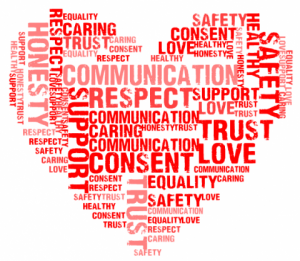This content was originally published by the Longmont Observer and is licensed under a Creative Commons license.
One in three adolescent girls in the United States will be a victim of teen dating violence. One in five teens knows someone who has been a victim. Yet, 81% of parents either say that teen dating violence is not an issue or they don’t know if it is an issue. Of parents, 82% felt confident they would know if their child was experiencing teen dating violence, yet only 58% correctly identified the warning signs. Only 33% of teen victims ever tell anybody about the violence. With such terrifying statistics, knowledge among parents and teens needs to be increased.
What exactly is teen dating violence? Teen dating violence refers not just to physical abuse, but also to emotional, verbal and sexual abuse. Physical abuse is most often recognized by people as abuse. It can be anything from throwing something at a person, to physically grabbing, biting, punching or kicking a person. According to loveisrespect.org, physical abuse is “any intentional and unwanted contact with you or something close to your body.”

Emotional and verbal abuse are not always easy to recognize, but can be just as damaging to a teenager. There are many behaviors that fit into this category. Stalking is one example that most people can relate to. But there are other, more subtle behaviors that qualify as abuse such as name-calling, yelling or screaming at a person, deliberate public embarrassment, and blaming the victim for the perpetrator’s abusive actions. Emotional abuse also includes telling a person who they can and cannot be friends with, what a person can do, and where a person is allowed to go. Gaslighting is a technique often used by abusers, and includes things like asking the victim if they are sure they remember things correctly or telling the victim they are too sensitive. A person using gaslighting may pretend they don’t remember what the victim is talking about or accuse them of making things up.
A specific type of emotional or verbal abuse that you might not have considered is digital abuse. According to loveisrespect.org, digital abuse is “the use of technologies such as texting and social networking to bully, harass, stalk, or intimidate a partner.” An abuser may tell the victim who they can be friends with on social media, or they may use social media to keep tabs on the victim. Abusers may insist on having the victim’s password to their social media accounts. Status updates may be used by abusers to put down their victims. Victims may be pressured to send sexually explicit pictures or videos. An abuser may constantly text the victim and become angry when the victim doesn’t immediately respond.
Sexual abuse includes rape, but also includes other things. A person may prevent the victim from protecting themselves against sexually transmitted diseases or unwanted pregnancy. Perpetrators of this kind of abuse may pressure the victim into sexual activity by making them feel guilty or immature for refusing. In short, sexual abuse includes any unwanted physical contact of a sexual nature.

As a parent, how do you recognize the signs of abuse in your child? You may want to believe that your child would come to you if they were experiencing abuse, but statistics show this is rare. Knowing some of the warning signs that your child may be involved in an abusive relationship is key to helping your child. There are several warning signs a parent can look for in their teen, such as your teen’s partner behaving jealously and checking on your teen frequently. Observe your teen with their partner. How does the partner behave? Does the partner frequently put down your teen or call them demeaning names? An abused teen may begin to spend less time with friends and family or give up other activities that they enjoy. In a physically abusive relationship, your teen may have injuries that aren’t explained.
Some of the warning signs may look just like normal adolescent development and it is up to you as the parent to try to distinguish between what is normal teenage behavior and when it is something more. Your teen’s grades may suddenly drop without an explanation. The teen may begin to exhibit signs of depression and anxiety, have difficulty in making decisions, and become secretive. Eating and sleeping habits may inexplicably change.
As a parent, you can empower your child to recognize the symptoms of teen dating violence in their own relationships. Talk to your kids and let them know what a healthy relationship should look like and tell them what warning signs to look out for. For example, let the teen know they may be in an unhealthy relationship if their partner tells them who to talk to, where to go, or what to wear. Let them know it is not normal to feel like they have to walk on eggshells around their partner for fear of how their partner may react.
If you recognize warning signs of an abusive relationship in your teen, let them know you are concerned for their safety. Keep the lines of communication open and offer to connect them with someone who can help them figure it out, such as a counselor or other professional that will keep the conversation confidential. Always make clear to your teen that the abuse is not their fault. Provide the teen with the information they need to know to be able to recognize warning signs themselves and let them know you are there for them if they want to talk about it. Always be nonjudgmental, talking about the behaviors rather than the person. Believe that your child is telling you the truth. Don’t give your teen an ultimatum, but decide on what the next step should be together. Finally, recognize that teen dating violence is not limited to female victims, but that males can also be victims.
The internet has some great resources for talking to your children about teen dating violence, such as this one from BreakTheCycle.org. You can also call the National Dating Abuse Helpline at 1-866-331-9474 for help finding resources. You will not always be able to watch your child to keep them safe, but you can empower them to learn the warning signs and to take action to protect themselves.


